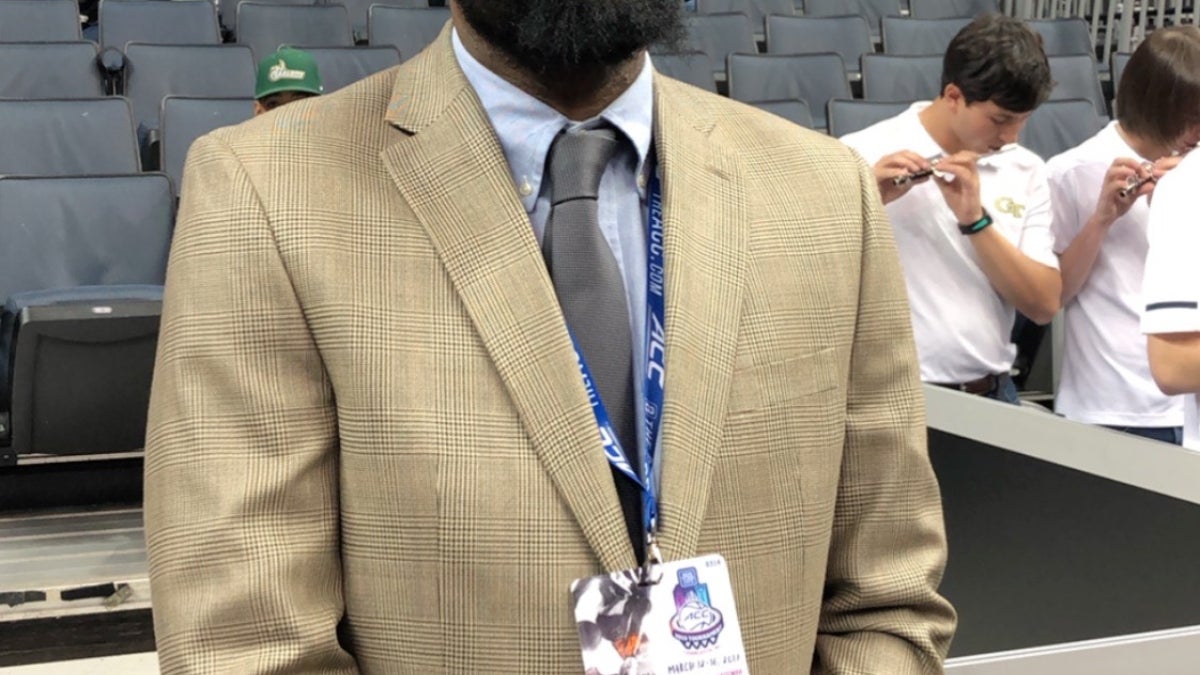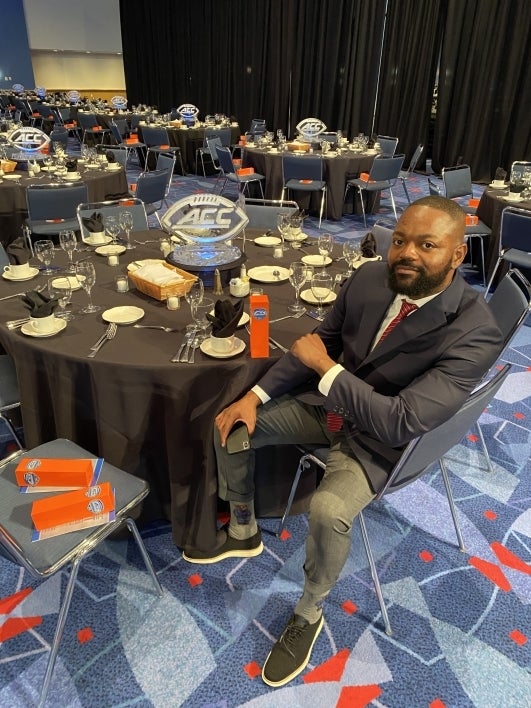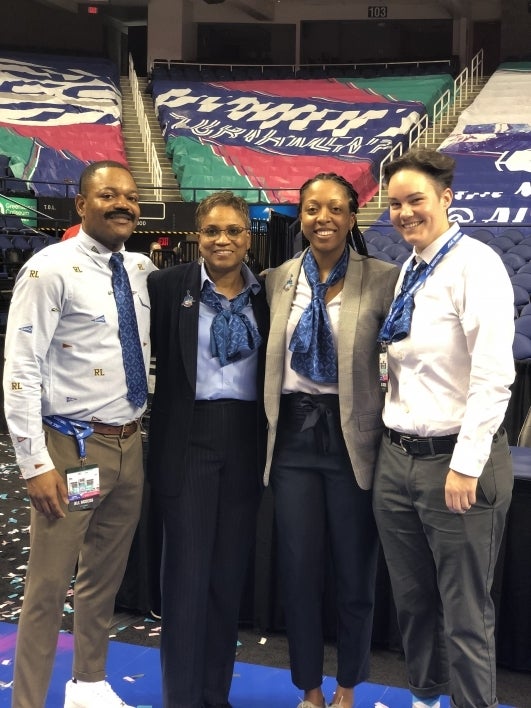Editor's note: This story is part of a series of profiles of notable spring 2020 graduates.
Coaches often demand their teams to “finish the game strong,” and that is exactly what a former high school star athlete and military veteran from North Carolina did this semester as he achieved a lifelong goal — finishing graduate school.
Jeffrey “LA” Logan completed his online Master of Sports Law and Business degree with the Sandra Day O’Connor College of Law this May, and on his way out earned the Dean’s Award for going “above and beyond” by making a “significant mark on the program.”
Logan, an Army veteran who served in Afghanistan and later in Iraq as a civilian contractor, is the third member of his family to earn a graduate degree, he said.
“It’s a huge weight off my shoulders,” Logan said. “I feel accomplished but there’s still more work to be done as far as my career.”
Currently, Logan is working on an internship with the Atlantic Coast Conference, better known as the ACC. He said the opportunity came about thanks in large part to his college faculty, and for that he is grateful.
“Professor Renaut, Professor Jarvis, they played a huge role in helping me network, teaching me valuable lessons,” Logan said. “I don’t know if I would have had a chance to work with the ACC without them pointing me in the right direction, giving me the right phone numbers and the right names.
“I know they work their tails off and they are trying to help each and every one of us students reach our goals, and they are willing to do anything and everything within their power to do so.”
Logan wants to start a career in sports compliance with a college or university. He is passionate about sports, and very interested in the issue of paying college athletes. In what follows, Logan provides insight into the topic, and discusses other aspects of his ASU journey.
Question: What was your “aha” moment, when you realized you wanted to study the field you majored in?
Answer: Maybe six months to a year before I enrolled at ASU, graduate school was just a thought. As the debate ensued about collegiate athletes being paid, I thought it was the perfect time to learn more about sports law and business. Every day I would wake up and all I could think about was athletes earning pay. This was the time when the O'Bannon case was at its forefront. Student athletes had not been paid for their name, image and likeness (NIL) amid being portrayed in NCAA sports video games. Moreover, Northwestern University student athletes took a stand and tried to unionize. Even though the athletes failed to unionize, they were not afraid to take on a fight with the NCAA. I felt that a change was coming regarding pay. A couple of years later, student athletes are well on their way to being able to earn pay from their NIL. I figured there would be a need for college campuses to hire more compliance professionals due to NIL legislation.
Q: What’s something you learned while at ASU — in the classroom or otherwise — that surprised you or changed your perspective?
A: Major changes in sports were decided in the courtroom; free agency, antitrust issues, collective bargaining, league sponsorships, the power of commissioners, college assistant coaches' pay, etc. Today, even in college sports, some assistant coaches sign multimillion dollar contracts. That was due to a Kansas court decision that the NCAA illegally restricted assistant college coaches' salaries under federal antitrust laws. In the early 1990s, the NCAA limited some assistant coaches salaries to $12,000 per academic term. Every case I read about while studying at ASU was more so a history lesson to how sports got to where they are today through courtroom battles.
Q: Why did you choose ASU?
A: While in undergrad, I took a sports law class that was really interesting. I wanted to find a graduate degree that focused on that subject. After doing some research, ASU provided that opportunity. Luckily, I applied to ASU when they first offered the Veterans Sports Law and Business degree. That told me ASU was serious about helping veterans strive for greatness. It was a no-brainer to apply, and I was blessed to be accepted.
Q: Which professor taught you the most important lesson while at ASU?
A: Between Professors Samuel Renaut and Stephanie Jarvis, I learned a ton. The lesson was simple — outwork everyone and don't get complacent. Working in sports is ultra-competitive. To combat that, I applied that simple valuable lesson from Renaut and Jarvis, which helped me become successful while attending ASU.
Q: What’s the best piece of advice you’d give to those still in school?
A: Hard work is not a cliché. That is the one thing you can control without anyone’s help. Last, you should conduct as many informational interviews as your schedule allows, whether in-person or by telephone. Those interviews are a great way to build relationships in your field and may lead to an internship or employment. The most important informational interview I conducted led to an internship with the ACC. Pressure is a privilege.
Q: What was your favorite spot on campus, whether for studying, meeting friends or just thinking about life?
A: I was an online student. During breaks, I would take hikes to really think about materials learned in class, and to just think about life and how I can reach my goals of working in college and professional sports.
Q: What are your plans after graduation?
A: Due to COVID-19, the sports industry is on hold. Before the pandemic, I was interning with ACC (compliance and women's basketball department) and working for ESPN. Once college sports resume, my goal is to seek employment within a college institute's compliance department.
Top photo: Jeffrey "LA" Logan pictured in the Spectrum Center prior to a game during the men's 2019 ACC Basketball Tournament in Charlotte, North Carolina. Courtesy photo/LA Logan
More Law, journalism and politics

Native Vote works to ensure the right to vote for Arizona's Native Americans
The Navajo Nation is in a remote area of northeastern Arizona, far away from the hustle of urban life. The 27,400-acre reservation is home to the Canyon de Chelly National Monument and…

New report documents Latinos’ critical roles in AI
According to a new report that traces the important role Latinos are playing in the growth of artificial intelligence technology across the country, Latinos are early adopters of AI.The 2024 Latino…

ASU's Carnegie-Knight News21 project examines the state of American democracy
In the latest project of Carnegie-Knight News21, a national reporting initiative and fellowship headquartered at Arizona State University’s Walter Cronkite School of Journalism and Mass Communication…


